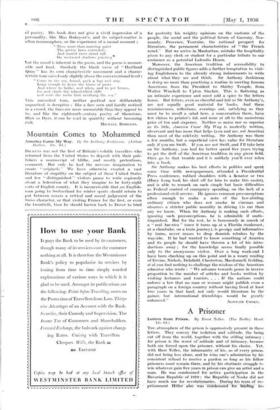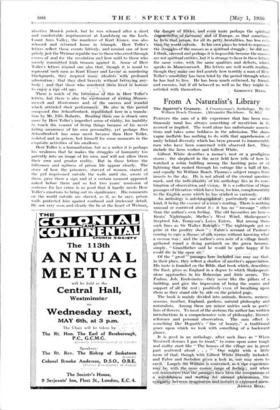A Prisoner
TUE atmosphere of the prison is oppressively present in these letters. They convey the isolation and solitude, the being cut off from the world, together with the stifling intimacy ; for prison is the worst of solitude and of intimacy, because both are forced upon the prisoner, without his choice. Yet, with Herr Toiler, the inhumanity of his, as of every prison, did:not bring loss alone, and he wins one's adudiation by his consistent refusal to receive a pardon so long as his fellow prisoners must remain there,- and by his obstinate struggle to win whatever gain five years-in prison- canrgive an artist and a man. He was eondenined for active participation in the Bavarian Republic of 1919: the Republic of Noske did not have much use for revolutionaries. During his term of im- 'PriInninent Aeffilini his abortive Munich putsch, but he was released after a short and comfortable imprisonment at Landsberg on the Lech. Count Arco Valley, the murderer of Kurt Eisner, was also released and returned home in triumph. Herr Toiler's letters reflect those events bitterly, and remind one of how grimly just the Weimar republic was to those who erred through excess of_,ieal for the revolution and haw mild to those who merely committed high treason against it. Some of Herr Teller's letters"' remind one also that,--though-it' is usual to as • represent such men as Kurt Eisner and Levine as rini rflering blackguards,'-the-Y inspired' mangy idealists "with' profound admiration ; that they died -lira-Vely withorifbarayiniany7 murdered ; and that those who uraered the-m- lived in lithiatir to enjoy ripe old age. - There is much of the bitterness. of this in Herr Toiler's letters, brit there is also the excitement of writing mat wh and Hinkemania and of the success and -scandal whieli attended their perfOrnitrige:2-He _also ' in this period
. ,
composed Das Schwallieribuch; republished here in a transia- tion- by Mf. Ellis Roberts. Reading tlielIi one is-Struck once snore' by Herr Toiler's lin-perfect sense of reality -his inability to touch the essence of living things because of his never failing !aw. awareness 'ofhis own personality, yet perhaps Das Schwalbenhuch has some merit because then Herr Toiler, isolated and in prison, lost himself for some moments in the
exquisite activities of his swallows. , Herr Toiler is a humanitarian, but as a writer it is perhaps his weakness that he makes the struggles of humanity too patently into an image of his own, and will not allow them their own and greater reality. But in these letters the bitterness and ugliness of prison life appear clearly. The story of how the prisoners, starved of women, stared at the girl imprisoned outside the walls until she, aware of them, gave them a sign and at a certain moment appeared naked before them and so lost two years' remission of sentence for her crime is so good that it hardly needs Herr 'roller's emotions to bring out its significance. His comments on the world outside are shrewd, as if, as he says, prison wails protected him against confused and irrelevant detail. lie saw very soon and clearly the lie at the heart of Weimar,
flip:tang& of .Ilitler,:and *Wei more perhaps the spiritual clefOttel'rokof.Gerina-4-: of Europe, so that sometimes he feegthat, prison, for all its petty-brutalities, has less evils tliaritheivoild Oiitaide. In his-*OWn plays he tried to represent the struggler; of the masses as a spiritual struggle ; he did not I think:sileeeed and perhaps it is impossible because the masses are not apiritual entities*, but it is strange to hear in these letters the same voice,... with -the same qualities and defects, which speaks in lilassennteitsch.Ilis letters arc well worth reading, though thek..inake-i-ine feel` acutely how terribly a man of Herr Toiler's sensibility; has:been tried by the period through which he has had toliye.• -He has been much criticised, by friends and enemies, but if all behaved as well as he they might be















































 Previous page
Previous page